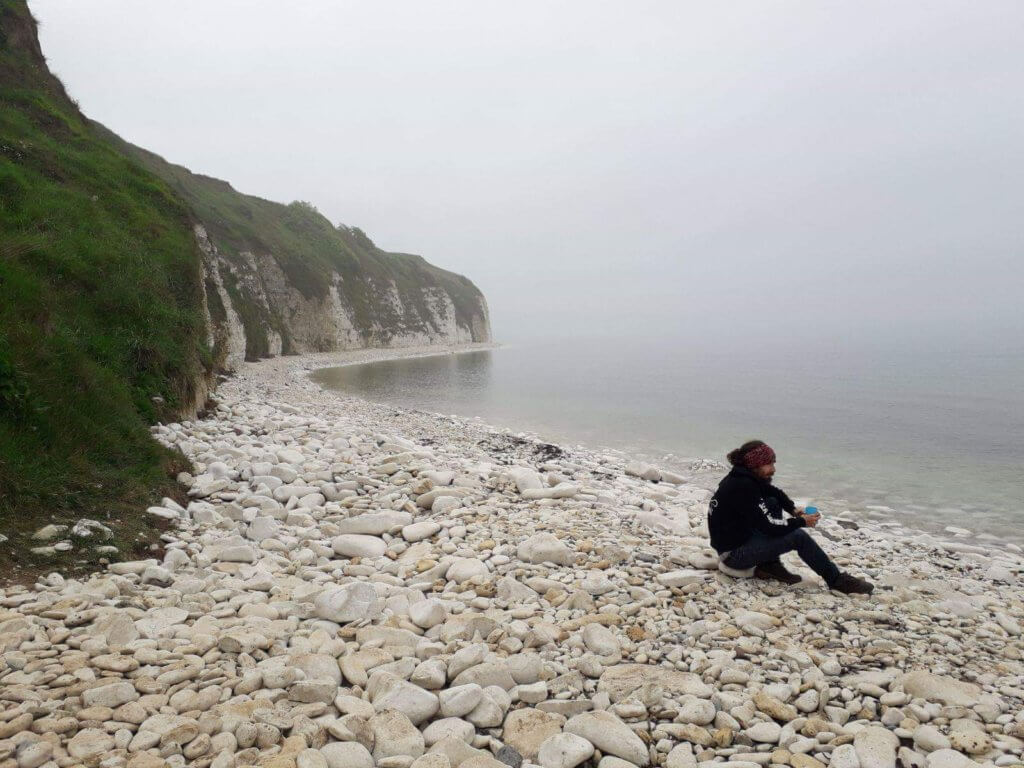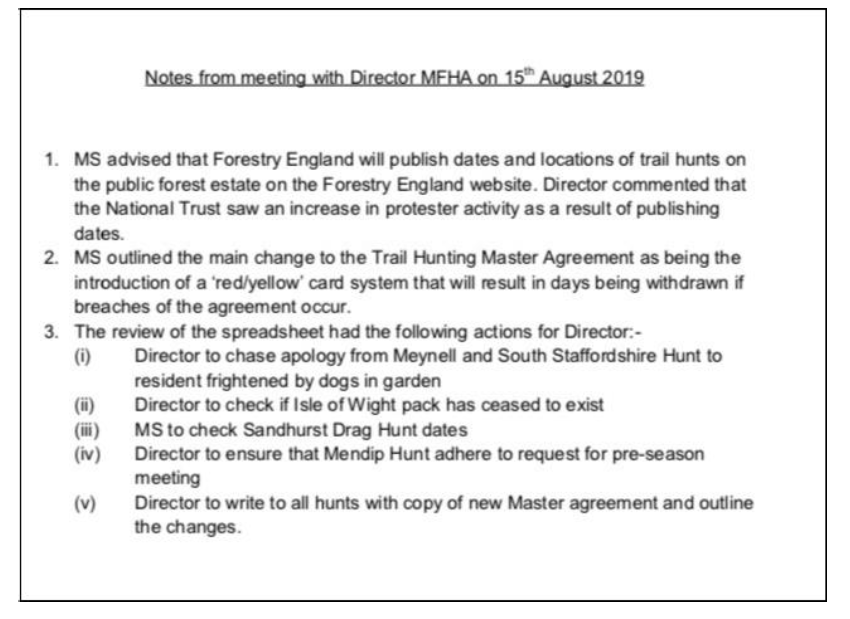
Jack Riggall is an independent hunt monitor and anti-hunting campaigner. He wrote a previous guest blog here, FC and Hunts, in February 2019.
The Forestry Commission recently announced, on Thursday 5th September, that they are changing their policy of licensing fox hunts and will begin publishing the dates of hunting meets as well as introducing a ‘red/yellow card’ system (see here) to keep a closer eye on licence breaches – more on that later. We know that when the National Trust made this key policy change in August 2017, the Countryside Alliance said it would lead to increased protestor activity (see here), and hunts such as the South Shropshire Hunt were then exposed and filmed by Shropshire Monitors pursuing foxes on National Trust land with their terrierman in tow as a result of the meets being published (see here), an example of the real reason hunts are typically unhappy with this change.
The full impact of the Forestry Commission’s update probably won’t be known until the hunting season finishes next year, but when the Forestry Commission recently met the Master of Foxhounds Association (MFHA) on 15th August, the MFHA Director stated that the National Trust policy had led to increased protestor activity, presumably stated in opposition to the Forestry Commission’s decision (see Point 1, below, of the Forestry Commission’s meeting notes released via a Freedom of Information request on 17th September). I’m told that the Forestry Commission will also soon start publishing the dates of meets for draghounds & bloodhounds, licensed under an agreement with the Master of Draghounds and Bloodhounds Association (MDBA), and these meets won’t be met with protests because they aren’t a cover for wildlife crime – unlike ‘trail hunting’.

The sole reason for this protest activity is that the public are tired of wildlife crime and expect decency towards wild animals from landowning charities like the National Trust, which currently is lacking, and especially from government departments such as the Forestry Commission.
Fox hunting continues despite the denials of those that take part and when people scrutinise ‘trail hunting’ properly, nobody is really fooled. In a review of the prosecution activity of the RSPCA in
2014, Stephen Wooler CB, the Crown Prosecution Service’s former Chief Inspector, stated that ‘The RSPCA found itself reacting to a thoroughly unsatisfactory situation where the evidence strongly indicated that it was “business as usual” for many hunts because enforcement of the 2004 legislation had become so difficult.’ (see here, P39).
Even when hunt employees are convicted for wildlife crime, such as the Cottesmore Hunt’s terrierman in 2015 (see here), Ian Gambles (the previous acting CEO for the Forestry Commission) said in response to a blog I wrote that criminal convictions i.e. for wildlife crime should not stop people taking part in organised activity (see here). Really? It was your land, Ian, and it was your decision what activities the Forestry Commission licensed. You should have been able to reflect on what wildlife crime convictions mean amongst people who claim they aren’t hunting wildlife anymore and act accordingly.
Interestingly, the Cottesmore Hunt were licensed by the Forestry Commission last season and were very recently filmed trespassing with hounds, terriers & quadbikes in a Site of Special Scientific Interest (SSSI) owned by Leicestershire & Rutland Wildlife Trust (see here & here). I wonder what ‘trail’ they were after in there, and I wonder if the Forestry Commission will licence them again?
With the Hunting Act 2004 so weak, a range of anti-hunt campaigners, both grassroots and professional, are calling for it to be strengthened (see here, here & here) and until that catches up,
there are different ways that people can oppose fox hunting. One, perhaps, is proving that they aren’t sticking to the agreements they have with the Forestry Commission (which is pretty much a
given) and, if the Forestry Commission respects its own agreement, stopping hunts from using public land to slaughter wildlife. With that in mind here’s some advice that everybody from hunt
saboteurs and monitors to visiting ecologists and ‘ordinary’ members of the public might be able to make use of (this is just what I think will help, I could be wrong, we’ll see):
- Report the hunt to the Forestry Commission by emailing the closest office to where you’ve
witnessed illegal hunting (which you can find here). - Please also send the information to [email protected] to allow all
the complaints to be compiled by anti-hunt campaigners as well as the Forestry Commission. - Include the following information: brief factual statements, photos and video footage if available, any police incident numbers [either for wildlife crime, intimidating behaviour or assault etc.], known breaches of either the Hunting Act 2004 or the Forestry Commission/MFHA Agreement for 2019-2021 (which you can see in full here).
- The most likely licence breaches, in my opinion, will be:
- …hunting close to the boundaries of Forestry Commission land or private dwellings (Section 11 & Appendix 2, Section 14).
- …driving vehicles on to Forestry Commission land (Section 12).
- …pursuing wild animals or disturbing livestock (Appendix 2, Sections 19.5, 19.6 & 24).
- …the use of more than two quadbikes on Forestry Commission land (Appendix 2, Section 20).
- …quadbike riders not wearing helmets or hi-viz jackets/waistcoats (Appendix 2, Section 20.1).
- …bringing more than 20 hounds on to Forestry Commission land (Appendix 2, Section 23).
- All of these are classed as ‘yellow card’ breaches as described by Appendix 2, Section 27, meaning two proven breaches will result in the hunt losing their licence, except for the
requirement for quadbike riders to wear helmets & hi-viz jackets/waistcoats which is a ‘red card’ breach i.e. the licence will be revoked if this is documented. - Testing what the Forestry Commission means what they say ‘adequate and proper arrangements are made to the satisfaction of the Forest Management Director to protect the
safety of participants, followers, Forestry England employees and all others likely to be within the vicinity of a Hunt’ is worth doing (Appendix 2, Section 13*).
You can also request copies of the hunts risk assessment under the Freedom of Information Act 2000 by emailing [email protected]. Remember that the Beaufort Hunt’s Boxing Day meet was cancelled by Tetbury Town Council last year on the basis that their risk assessment wasn’t good enough (see here) and this was only possible due to anti-hunt
campaigners highlighting that fact.
Useful Links
- Hunting Dates: The full list of hunt meets for Forestry Commission land can be seen here. Any hunts on Forestry Commission land outside of these dates are likely to be trespassing [but keep in mind may have the sporting rights to the land], and can be reported using the instructions
above. - Maps: Maps of all Forestry Commission land to enable you to understand when hunts are potentially trespassing (i.e. on Forestry Commission land on dates they aren’t licensed) can be seen here. To see only the land boundaries, unselect everything in the data except Forest Enterprise Land 2017, which is on the drop down menu from Forestry Commission. Licensed hunts will sometimes trespass on Forestry Commission land as I highlighted in a previous blog on this site (see here), something that is highly unlikely to happen if the hunts are following pre-laid trails.
N.B. – unfortunately the Forestry Commission isn’t currently publishing the areas that hunts are permitted to use, but you can send in EIR requests under the Environmental Information
Regulations 2004 to [email protected] to ask for the licensed area maps of specific hunts that will be in Appendix 2, Schedule I of the MFHA Agreement for 2019- 21. - Hunting Agreement: The agreement between the MFHA & the Forestry Commission for 2019- 21 can be seen here. Breaches should be reported using the instructions above.
For those needing advice about hunting on Forestry Commission land, an email has been set up – please contact [email protected].
[registration_form]
Fox hunters, in my opinion pretty much the lowest scum on the planet.
Round them up, throw a few to a pride of lions and make the rest watch.
Daniel – really? I don’t think I’d support that approach.
Daniel, fox hunting is certainly a very violent treatment of animals – but so is what you’re suggesting. Maybe calm down? It [fox hunting] is slowly collapsing in the UK.
Due to building .
NB. Is the organised walking of dogs as a business not hunting?( From wildlife point of view..if not the dogs !)
If the organised walking of dogs as a business were to include the premeditated blocking of badger setts to prevent foxes escaping then yes I would class it as hunting. As it happens though, I’m only aware of the Forestry Commission licensed ‘trail hunts’ doing this: https://youtu.be/zEUMh1ZuH8w.
Brilliant article, really useful, setting out in clear terms what to look our for in terms of licence breaches, and how to report them.
Also, this:
‘The sole reason for this protest activity is that the public are tired of wildlife crime and expect decency towards wild animals from landowning charities like the National Trust, which currently is lacking, and especially from government departments such as the Forestry Commission.’ – absolutely.
Scruff – thank you for your first comment here
Cracking work Jack.
Matt – thanks for your first comment here.